Biometric
Artificial Intelligence
Document Verification
Knowledge-Based Authentication
Digital Identity
Single Factor Authentication
Two Factor Authentication
Multi Factor Authentication
Banking and Financial Services
Government
Telecommunications
E-Commerce
Healthcare
On-Premises
Cloud-Based
North America
Europe
South America
Asia Pacific
Middle East and Africa
North America Outlook (USD Billion, 2019-2035)
Identity Verification Market by Technology Type
Biometric
Artificial Intelligence
Document Verification
Knowledge-Based Authentication
Digital Identity
Identity Verification Market by Authentication Method Type
Single Factor Authentication
Two Factor Authentication
Multi Factor Authentication
Identity Verification Market by End Use Type
Banking and Financial Services
Government
Telecommunications
E-Commerce
Healthcare
Identity Verification Market by Deployment Mode Type
On-Premises
Cloud-Based
Identity Verification Market by Regional Type
US
Canada
US Outlook (USD Billion, 2019-2035)
Identity Verification Market by Technology Type
Biometric
Artificial Intelligence
Document Verification
Knowledge-Based Authentication
Digital Identity
Identity Verification Market by Authentication Method Type
Single Factor Authentication
Two Factor Authentication
Multi Factor Authentication
Identity Verification Market by End Use Type
Banking and Financial Services
Government
Telecommunications
E-Commerce
Healthcare
Identity Verification Market by Deployment Mode Type
On-Premises
Cloud-Based
CANADA Outlook (USD Billion, 2019-2035)
Identity Verification Market by Technology Type
Biometric
Artificial Intelligence
Document Verification
Knowledge-Based Authentication
Digital Identity
Identity Verification Market by Authentication Method Type
Single Factor Authentication
Two Factor Authentication
Multi Factor Authentication
Identity Verification Market by End Use Type
Banking and Financial Services
Government
Telecommunications
E-Commerce
Healthcare
Identity Verification Market by Deployment Mode Type
On-Premises
Cloud-Based
Europe Outlook (USD Billion, 2019-2035)
Identity Verification Market by Technology Type
Biometric
Artificial Intelligence
Document Verification
Knowledge-Based Authentication
Digital Identity
Identity Verification Market by Authentication Method Type
Single Factor Authentication
Two Factor Authentication
Multi Factor Authentication
Identity Verification Market by End Use Type
Banking and Financial Services
Government
Telecommunications
E-Commerce
Healthcare
Identity Verification Market by Deployment Mode Type
On-Premises
Cloud-Based
Identity Verification Market by Regional Type
Germany
UK
France
Russia
Italy
Spain
Rest of Europe
GERMANY Outlook (USD Billion, 2019-2035)
Identity Verification Market by Technology Type
Biometric
Artificial Intelligence
Document Verification
Knowledge-Based Authentication
Digital Identity
Identity Verification Market by Authentication Method Type
Single Factor Authentication
Two Factor Authentication
Multi Factor Authentication
Identity Verification Market by End Use Type
Banking and Financial Services
Government
Telecommunications
E-Commerce
Healthcare
Identity Verification Market by Deployment Mode Type
On-Premises
Cloud-Based
UK Outlook (USD Billion, 2019-2035)
Identity Verification Market by Technology Type
Biometric
Artificial Intelligence
Document Verification
Knowledge-Based Authentication
Digital Identity
Identity Verification Market by Authentication Method Type
Single Factor Authentication
Two Factor Authentication
Multi Factor Authentication
Identity Verification Market by End Use Type
Banking and Financial Services
Government
Telecommunications
E-Commerce
Healthcare
Identity Verification Market by Deployment Mode Type
On-Premises
Cloud-Based
FRANCE Outlook (USD Billion, 2019-2035)
Identity Verification Market by Technology Type
Biometric
Artificial Intelligence
Document Verification
Knowledge-Based Authentication
Digital Identity
Identity Verification Market by Authentication Method Type
Single Factor Authentication
Two Factor Authentication
Multi Factor Authentication
Identity Verification Market by End Use Type
Banking and Financial Services
Government
Telecommunications
E-Commerce
Healthcare
Identity Verification Market by Deployment Mode Type
On-Premises
Cloud-Based
RUSSIA Outlook (USD Billion, 2019-2035)
Identity Verification Market by Technology Type
Biometric
Artificial Intelligence
Document Verification
Knowledge-Based Authentication
Digital Identity
Identity Verification Market by Authentication Method Type
Single Factor Authentication
Two Factor Authentication
Multi Factor Authentication
Identity Verification Market by End Use Type
Banking and Financial Services
Government
Telecommunications
E-Commerce
Healthcare
Identity Verification Market by Deployment Mode Type
On-Premises
Cloud-Based
ITALY Outlook (USD Billion, 2019-2035)
Identity Verification Market by Technology Type
Biometric
Artificial Intelligence
Document Verification
Knowledge-Based Authentication
Digital Identity
Identity Verification Market by Authentication Method Type
Single Factor Authentication
Two Factor Authentication
Multi Factor Authentication
Identity Verification Market by End Use Type
Banking and Financial Services
Government
Telecommunications
E-Commerce
Healthcare
Identity Verification Market by Deployment Mode Type
On-Premises
Cloud-Based
SPAIN Outlook (USD Billion, 2019-2035)
Identity Verification Market by Technology Type
Biometric
Artificial Intelligence
Document Verification
Knowledge-Based Authentication
Digital Identity
Identity Verification Market by Authentication Method Type
Single Factor Authentication
Two Factor Authentication
Multi Factor Authentication
Identity Verification Market by End Use Type
Banking and Financial Services
Government
Telecommunications
E-Commerce
Healthcare
Identity Verification Market by Deployment Mode Type
On-Premises
Cloud-Based
REST OF EUROPE Outlook (USD Billion, 2019-2035)
Identity Verification Market by Technology Type
Biometric
Artificial Intelligence
Document Verification
Knowledge-Based Authentication
Digital Identity
Identity Verification Market by Authentication Method Type
Single Factor Authentication
Two Factor Authentication
Multi Factor Authentication
Identity Verification Market by End Use Type
Banking and Financial Services
Government
Telecommunications
E-Commerce
Healthcare
Identity Verification Market by Deployment Mode Type
On-Premises
Cloud-Based
APAC Outlook (USD Billion, 2019-2035)
Identity Verification Market by Technology Type
Biometric
Artificial Intelligence
Document Verification
Knowledge-Based Authentication
Digital Identity
Identity Verification Market by Authentication Method Type
Single Factor Authentication
Two Factor Authentication
Multi Factor Authentication
Identity Verification Market by End Use Type
Banking and Financial Services
Government
Telecommunications
E-Commerce
Healthcare
Identity Verification Market by Deployment Mode Type
On-Premises
Cloud-Based
Identity Verification Market by Regional Type
China
India
Japan
South Korea
Malaysia
Thailand
Indonesia
Rest of APAC
CHINA Outlook (USD Billion, 2019-2035)
Identity Verification Market by Technology Type
Biometric
Artificial Intelligence
Document Verification
Knowledge-Based Authentication
Digital Identity
Identity Verification Market by Authentication Method Type
Single Factor Authentication
Two Factor Authentication
Multi Factor Authentication
Identity Verification Market by End Use Type
Banking and Financial Services
Government
Telecommunications
E-Commerce
Healthcare
Identity Verification Market by Deployment Mode Type
On-Premises
Cloud-Based
INDIA Outlook (USD Billion, 2019-2035)
Identity Verification Market by Technology Type
Biometric
Artificial Intelligence
Document Verification
Knowledge-Based Authentication
Digital Identity
Identity Verification Market by Authentication Method Type
Single Factor Authentication
Two Factor Authentication
Multi Factor Authentication
Identity Verification Market by End Use Type
Banking and Financial Services
Government
Telecommunications
E-Commerce
Healthcare
Identity Verification Market by Deployment Mode Type
On-Premises
Cloud-Based
JAPAN Outlook (USD Billion, 2019-2035)
Identity Verification Market by Technology Type
Biometric
Artificial Intelligence
Document Verification
Knowledge-Based Authentication
Digital Identity
Identity Verification Market by Authentication Method Type
Single Factor Authentication
Two Factor Authentication
Multi Factor Authentication
Identity Verification Market by End Use Type
Banking and Financial Services
Government
Telecommunications
E-Commerce
Healthcare
Identity Verification Market by Deployment Mode Type
On-Premises
Cloud-Based
SOUTH KOREA Outlook (USD Billion, 2019-2035)
Identity Verification Market by Technology Type
Biometric
Artificial Intelligence
Document Verification
Knowledge-Based Authentication
Digital Identity
Identity Verification Market by Authentication Method Type
Single Factor Authentication
Two Factor Authentication
Multi Factor Authentication
Identity Verification Market by End Use Type
Banking and Financial Services
Government
Telecommunications
E-Commerce
Healthcare
Identity Verification Market by Deployment Mode Type
On-Premises
Cloud-Based
MALAYSIA Outlook (USD Billion, 2019-2035)
Identity Verification Market by Technology Type
Biometric
Artificial Intelligence
Document Verification
Knowledge-Based Authentication
Digital Identity
Identity Verification Market by Authentication Method Type
Single Factor Authentication
Two Factor Authentication
Multi Factor Authentication
Identity Verification Market by End Use Type
Banking and Financial Services
Government
Telecommunications
E-Commerce
Healthcare
Identity Verification Market by Deployment Mode Type
On-Premises
Cloud-Based
THAILAND Outlook (USD Billion, 2019-2035)
Identity Verification Market by Technology Type
Biometric
Artificial Intelligence
Document Verification
Knowledge-Based Authentication
Digital Identity
Identity Verification Market by Authentication Method Type
Single Factor Authentication
Two Factor Authentication
Multi Factor Authentication
Identity Verification Market by End Use Type
Banking and Financial Services
Government
Telecommunications
E-Commerce
Healthcare
Identity Verification Market by Deployment Mode Type
On-Premises
Cloud-Based
INDONESIA Outlook (USD Billion, 2019-2035)
Identity Verification Market by Technology Type
Biometric
Artificial Intelligence
Document Verification
Knowledge-Based Authentication
Digital Identity
Identity Verification Market by Authentication Method Type
Single Factor Authentication
Two Factor Authentication
Multi Factor Authentication
Identity Verification Market by End Use Type
Banking and Financial Services
Government
Telecommunications
E-Commerce
Healthcare
Identity Verification Market by Deployment Mode Type
On-Premises
Cloud-Based
REST OF APAC Outlook (USD Billion, 2019-2035)
Identity Verification Market by Technology Type
Biometric
Artificial Intelligence
Document Verification
Knowledge-Based Authentication
Digital Identity
Identity Verification Market by Authentication Method Type
Single Factor Authentication
Two Factor Authentication
Multi Factor Authentication
Identity Verification Market by End Use Type
Banking and Financial Services
Government
Telecommunications
E-Commerce
Healthcare
Identity Verification Market by Deployment Mode Type
On-Premises
Cloud-Based
South America Outlook (USD Billion, 2019-2035)
Identity Verification Market by Technology Type
Biometric
Artificial Intelligence
Document Verification
Knowledge-Based Authentication
Digital Identity
Identity Verification Market by Authentication Method Type
Single Factor Authentication
Two Factor Authentication
Multi Factor Authentication
Identity Verification Market by End Use Type
Banking and Financial Services
Government
Telecommunications
E-Commerce
Healthcare
Identity Verification Market by Deployment Mode Type
On-Premises
Cloud-Based
Identity Verification Market by Regional Type
Brazil
Mexico
Argentina
Rest of South America
BRAZIL Outlook (USD Billion, 2019-2035)
Identity Verification Market by Technology Type
Biometric
Artificial Intelligence
Document Verification
Knowledge-Based Authentication
Digital Identity
Identity Verification Market by Authentication Method Type
Single Factor Authentication
Two Factor Authentication
Multi Factor Authentication
Identity Verification Market by End Use Type
Banking and Financial Services
Government
Telecommunications
E-Commerce
Healthcare
Identity Verification Market by Deployment Mode Type
On-Premises
Cloud-Based
MEXICO Outlook (USD Billion, 2019-2035)
Identity Verification Market by Technology Type
Biometric
Artificial Intelligence
Document Verification
Knowledge-Based Authentication
Digital Identity
Identity Verification Market by Authentication Method Type
Single Factor Authentication
Two Factor Authentication
Multi Factor Authentication
Identity Verification Market by End Use Type
Banking and Financial Services
Government
Telecommunications
E-Commerce
Healthcare
Identity Verification Market by Deployment Mode Type
On-Premises
Cloud-Based
ARGENTINA Outlook (USD Billion, 2019-2035)
Identity Verification Market by Technology Type
Biometric
Artificial Intelligence
Document Verification
Knowledge-Based Authentication
Digital Identity
Identity Verification Market by Authentication Method Type
Single Factor Authentication
Two Factor Authentication
Multi Factor Authentication
Identity Verification Market by End Use Type
Banking and Financial Services
Government
Telecommunications
E-Commerce
Healthcare
Identity Verification Market by Deployment Mode Type
On-Premises
Cloud-Based
REST OF SOUTH AMERICA Outlook (USD Billion, 2019-2035)
Identity Verification Market by Technology Type
Biometric
Artificial Intelligence
Document Verification
Knowledge-Based Authentication
Digital Identity
Identity Verification Market by Authentication Method Type
Single Factor Authentication
Two Factor Authentication
Multi Factor Authentication
Identity Verification Market by End Use Type
Banking and Financial Services
Government
Telecommunications
E-Commerce
Healthcare
Identity Verification Market by Deployment Mode Type
On-Premises
Cloud-Based
MEA Outlook (USD Billion, 2019-2035)
Identity Verification Market by Technology Type
Biometric
Artificial Intelligence
Document Verification
Knowledge-Based Authentication
Digital Identity
Identity Verification Market by Authentication Method Type
Single Factor Authentication
Two Factor Authentication
Multi Factor Authentication
Identity Verification Market by End Use Type
Banking and Financial Services
Government
Telecommunications
E-Commerce
Healthcare
Identity Verification Market by Deployment Mode Type
On-Premises
Cloud-Based
Identity Verification Market by Regional Type
GCC Countries
South Africa
Rest of MEA
GCC COUNTRIES Outlook (USD Billion, 2019-2035)
Identity Verification Market by Technology Type
Biometric
Artificial Intelligence
Document Verification
Knowledge-Based Authentication
Digital Identity
Identity Verification Market by Authentication Method Type
Single Factor Authentication
Two Factor Authentication
Multi Factor Authentication
Identity Verification Market by End Use Type
Banking and Financial Services
Government
Telecommunications
E-Commerce
Healthcare
Identity Verification Market by Deployment Mode Type
On-Premises
Cloud-Based
SOUTH AFRICA Outlook (USD Billion, 2019-2035)
Identity Verification Market by Technology Type
Biometric
Artificial Intelligence
Document Verification
Knowledge-Based Authentication
Digital Identity
Identity Verification Market by Authentication Method Type
Single Factor Authentication
Two Factor Authentication
Multi Factor Authentication
Identity Verification Market by End Use Type
Banking and Financial Services
Government
Telecommunications
E-Commerce
Healthcare
Identity Verification Market by Deployment Mode Type
On-Premises
Cloud-Based
REST OF MEA Outlook (USD Billion, 2019-2035)
Identity Verification Market by Technology Type
Biometric
Artificial Intelligence
Document Verification
Knowledge-Based Authentication
Digital Identity
Identity Verification Market by Authentication Method Type
Single Factor Authentication
Two Factor Authentication
Multi Factor Authentication
Identity Verification Market by End Use Type
Banking and Financial Services
Government
Telecommunications
E-Commerce
Healthcare
Identity Verification Market by Deployment Mode Type
On-Premises
Cloud-Based
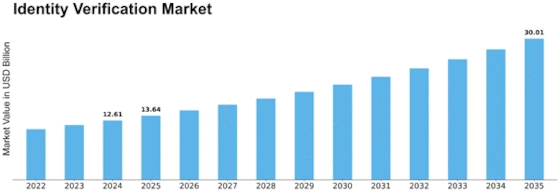


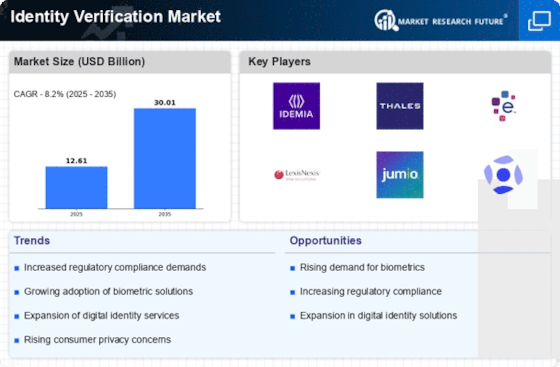
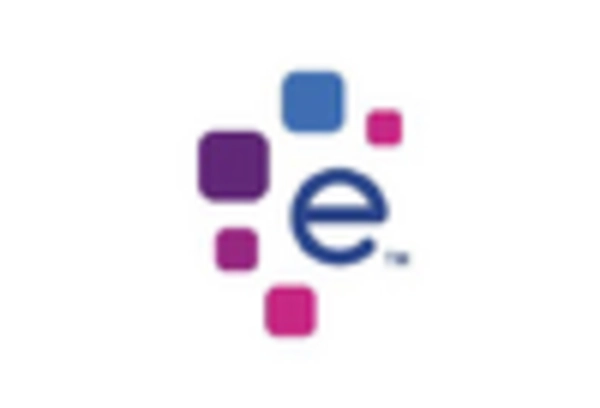

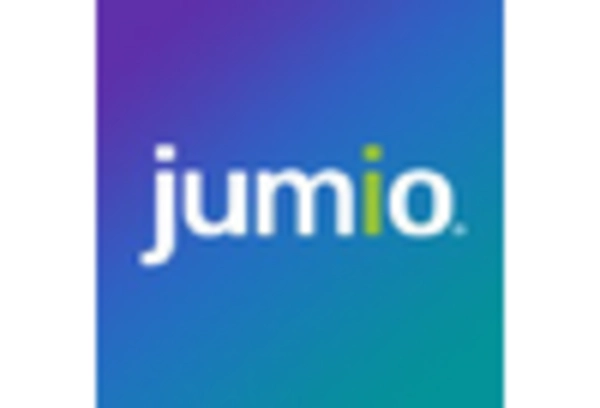
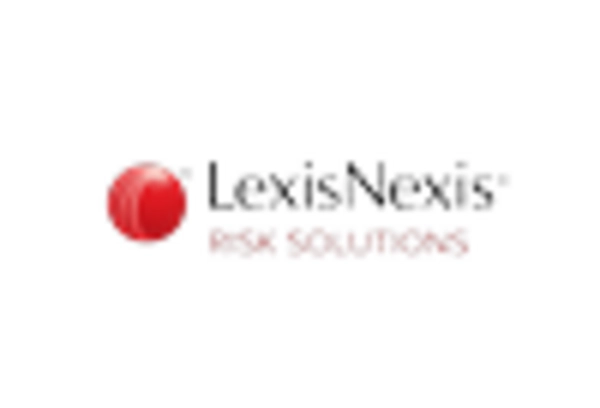












Leave a Comment